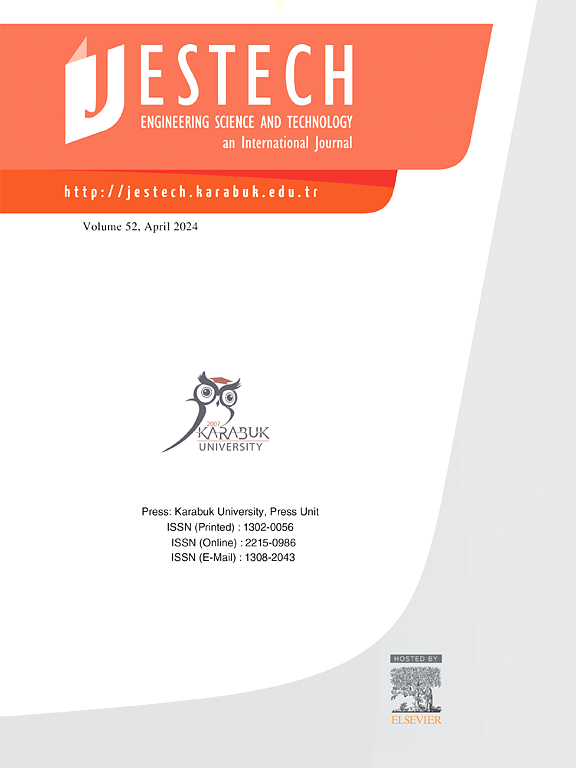Boost pressure influence on combustion, emission characteristics, and performance of diesel engines with various fuel types
IF 5.1
2区 工程技术
Q1 ENGINEERING, MULTIDISCIPLINARY
Engineering Science and Technology-An International Journal-Jestech
Pub Date : 2025-02-07
DOI:10.1016/j.jestch.2025.101983
引用次数: 0
Abstract
This study investigates the effects of varying boost pressure levels on engine performance, combustion characteristics, and emissions using different fuel types (diesel, B50, B100) under various engine loads. The results show that increasing boost pressure generally enhances engine performance by raising in-cylinder pressure and heat release rates. For instance, at 75 % engine load, the cylinder pressure increased by 18.7 % for diesel and 15.9 % for B100 when the boost pressure was raised from −20 % to + 20 %. Similarly, combustion efficiency improved, with ignition delay reduced by approximately 4.1 % for diesel and 6.5 % for B100 under the same conditions. However, higher boost pressure also led to increased Brake Specific Fuel Consumption (BSFC), particularly for biodiesel fuels; for B100, BSFC increased from 297.1 g/kWh to 304.95 g/kWh at 50 % engine load. In terms of emissions, higher boost pressure significantly decreased CO and HC emissions by up to 7.5 % and 15.3 %, respectively, for B100. Nevertheless, NOx emissions increased by 5.3 % due to the oxygen content of biodiesel. Soot emissions were notably reduced, with a maximum reduction of 58.4 % observed at 75 % engine load and + 20 % boost pressure for diesel fuel. These findings underscore the need for additional strategies to control NOx emissions, especially for biodiesel applications. In conclusion, optimizing boost pressure is critical for improving engine performance and emissions. Biodiesel and its blends, despite their higher NOx emissions, provide significant environmental benefits due to their cleaner combustion characteristics. This study contributes valuable insights for designing more efficient and sustainable internal combustion engines.
增压压力对不同燃料类型柴油机燃烧、排放特性和性能的影响
本研究调查了不同增压压力水平对发动机性能、燃烧特性和排放的影响,使用不同的燃料类型(柴油、B50、B100)在不同的发动机负载下。结果表明,增压压力的增加通常通过提高缸内压力和热释放率来提高发动机的性能。例如,在75%的发动机负荷下,当增压压力从- 20%提高到+ 20%时,柴油的气缸压力增加了18.7%,B100的气缸压力增加了15.9%。同样,燃烧效率也得到了提高,在相同的条件下,柴油和B100的点火延迟分别减少了约4.1%和6.5%。然而,更高的增压压力也会导致制动比燃料消耗(BSFC)的增加,特别是对于生物柴油燃料;对于B100,在发动机负荷为50%时,BSFC从297.1 g/kWh增加到304.95 g/kWh。在排放方面,更高的增压压力显著降低了B100的CO和HC排放量,分别高达7.5%和15.3%。然而,由于生物柴油的氧含量,氮氧化物排放量增加了5.3%。烟尘排放明显减少,在75%的发动机负荷和+ 20%的柴油增压压力下,最大减少58.4%。这些发现强调了控制氮氧化物排放的额外策略的必要性,特别是对于生物柴油的应用。总之,优化增压压力对于改善发动机性能和排放至关重要。尽管生物柴油及其混合物的氮氧化物排放量较高,但由于其更清洁的燃烧特性,可提供显著的环境效益。这项研究为设计更高效和可持续的内燃机提供了宝贵的见解。
本文章由计算机程序翻译,如有差异,请以英文原文为准。
求助全文
约1分钟内获得全文
求助全文
来源期刊

Engineering Science and Technology-An International Journal-Jestech
Materials Science-Electronic, Optical and Magnetic Materials
CiteScore
11.20
自引率
3.50%
发文量
153
审稿时长
22 days
期刊介绍:
Engineering Science and Technology, an International Journal (JESTECH) (formerly Technology), a peer-reviewed quarterly engineering journal, publishes both theoretical and experimental high quality papers of permanent interest, not previously published in journals, in the field of engineering and applied science which aims to promote the theory and practice of technology and engineering. In addition to peer-reviewed original research papers, the Editorial Board welcomes original research reports, state-of-the-art reviews and communications in the broadly defined field of engineering science and technology.
The scope of JESTECH includes a wide spectrum of subjects including:
-Electrical/Electronics and Computer Engineering (Biomedical Engineering and Instrumentation; Coding, Cryptography, and Information Protection; Communications, Networks, Mobile Computing and Distributed Systems; Compilers and Operating Systems; Computer Architecture, Parallel Processing, and Dependability; Computer Vision and Robotics; Control Theory; Electromagnetic Waves, Microwave Techniques and Antennas; Embedded Systems; Integrated Circuits, VLSI Design, Testing, and CAD; Microelectromechanical Systems; Microelectronics, and Electronic Devices and Circuits; Power, Energy and Energy Conversion Systems; Signal, Image, and Speech Processing)
-Mechanical and Civil Engineering (Automotive Technologies; Biomechanics; Construction Materials; Design and Manufacturing; Dynamics and Control; Energy Generation, Utilization, Conversion, and Storage; Fluid Mechanics and Hydraulics; Heat and Mass Transfer; Micro-Nano Sciences; Renewable and Sustainable Energy Technologies; Robotics and Mechatronics; Solid Mechanics and Structure; Thermal Sciences)
-Metallurgical and Materials Engineering (Advanced Materials Science; Biomaterials; Ceramic and Inorgnanic Materials; Electronic-Magnetic Materials; Energy and Environment; Materials Characterizastion; Metallurgy; Polymers and Nanocomposites)
 求助内容:
求助内容: 应助结果提醒方式:
应助结果提醒方式:


